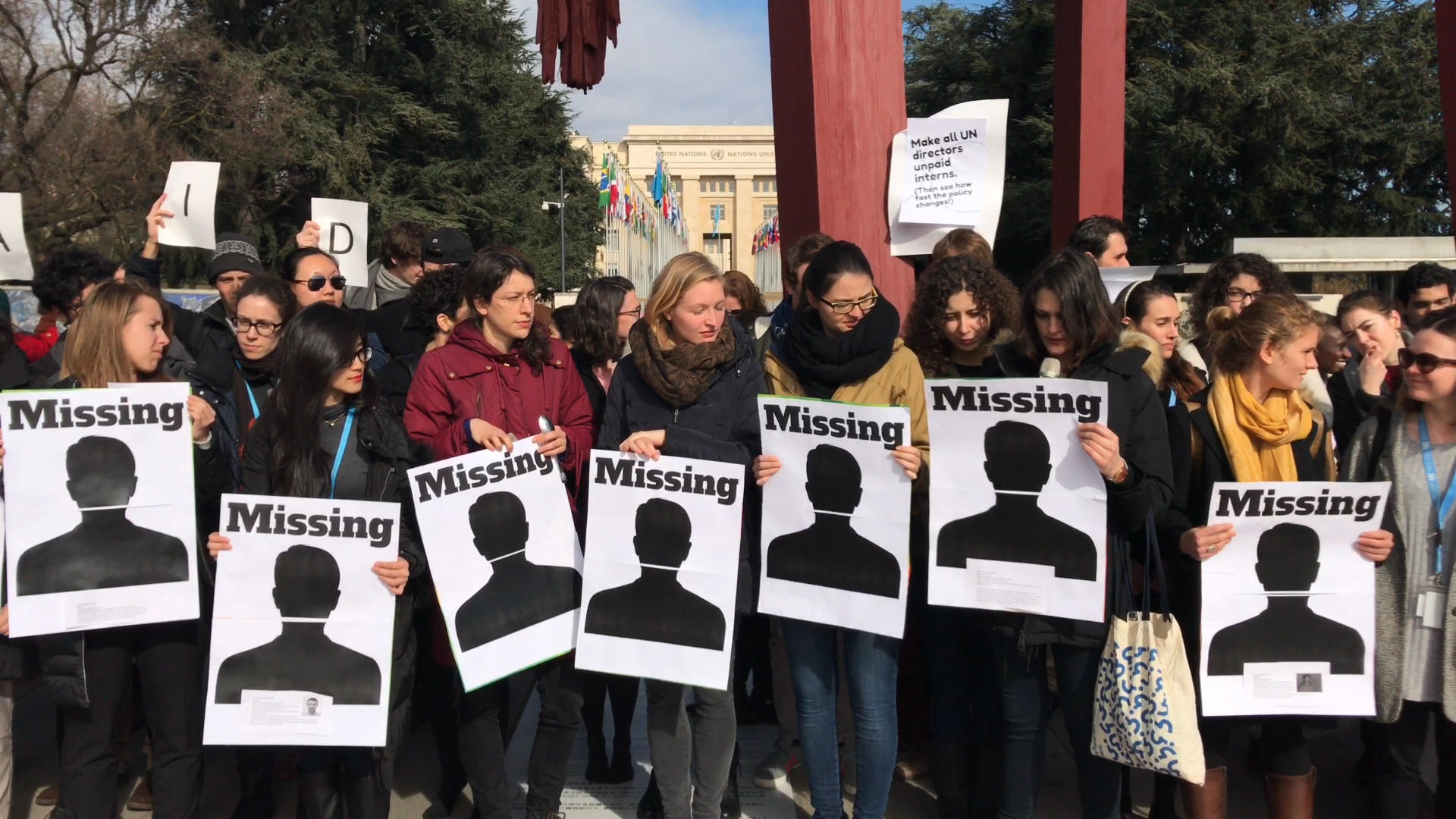
Geneva interns take part in global protest

Around 100 interns and supporters protested outside the United Nations European headquarters on Monday as part of a global initiative to highlight the plight of unpaid internships. Similar protests have been taking place in New York, Washington, Brussels and Vienna.
In Geneva, interns from the UN, and various international agencies and non-governmental organisations gathered at the Place des Nations square, together with employers, unions and students to call for ‘equal access to fair, ‘quality internships’.
“I’m protesting in solidarity with the people who cannot afford to be here,” said Jaime, a 22-year-old British man who is completing a three-month internship at the World Health Organization (WHO) in the Swiss city. “We need to make ourselves heard and show the level of support we have from different sectors…and show that we deserve the same rights as employed staff, since we are doing valuable work for the organisations.”

More
Intern demo
In 2014, there were an estimated 4,000 UN interns in New York and Geneva, mostly unpaid. A 2013 survey by the Geneva Interns Association found that 68% of interns received no salary at all.
While a handful of UN agencies in Geneva like the International Labour Organization (ILO) pay interns – the ILO pays CHF2,200 per month – they are a minority. Geneva is also very expensive. A six-month unpaid internship can require a budget of at least CHF8,000 ($8,296), meaning that only the wealthy apply.
“The system is unfair as only people like me can afford to be here, while there are plenty of other poorer people with different backgrounds who are equally deserving,” said Jaime, adding that he could not afford to do another unpaid internship when the current one ends.
Getting organised
The protest movement has been growing steadily over the past couple of years and has become increasingly organised.
On Monday, interns in Geneva were joined by members of the Swiss Green Party, the leftwing Social Democratic Party, as well as local and international unions, including the UN Staff Union.
UN departments, unable to expand budgets and recruit staff, increasingly turn to young graduates willing to work for free for two to six months. The UN says it would like to pay interns but claims its hands are tied by a resolution passed in 1997 that forbids the payment of non-staff. The UN claims it is up to member states to change things. However, neither the UN nor individual member states have made any commitments.
Despite this UN blockage, campaigners have witnessed other breakthroughs. Last Friday, activists celebrated a report by the European Union OmbudsmanExternal link urging the European External Action Service (EEAS) to pay all its interns to open the door to people from poor backgrounds. The EEAS has almost 800 trainees in its delegations around the world, including Geneva, who work full time for free. The ombudsman’s recommendations are non-binding but EU institutions usually follow them.
Geneva interns hope to file a similar complaint with the UN ombudsman. They are also hopeful that the new UN secretary general Antonio Guterres will adopt a ‘more progressive’ approach to interns and help change UN policy to make intern positions more accessible to people from around the world after years of stonewalling by Ban Ki-Moon.
Slow progress
Meanwhile, after a successful yearlong campaign by the ILO intern board, the ILO raised the stipend for their interns by 20%. The UN children’s agency UNICEF also announced last May that it was trialling a new internship system offering stipends. Elsewhere, the Geneva cantonal labour office has also established new rules to remunerate certain internships, which are not part of a course of study.
The movement has also received wider support from unions and other groups, such as the Council of Global Unions (CGU), whose members represent more than 200 million workers, and smaller groups like the “We Pay Our Interns Coalition”, a group of over 25 Geneva NGOs trying to improve intern conditions.
Campaigners criticize the use of interns as cheap or free labour, which they say has become a negative employment trend across many sectors of the economy, not just international organisations. While in the 1980s only 3% of US graduates completed an internship, that figure has risen to 75%. Unions say precarious internships are replacing-entry level jobs at a time when unemployment is a key problem facing young people across the world.

In compliance with the JTI standards
More: SWI swissinfo.ch certified by the Journalism Trust Initiative






























You can find an overview of ongoing debates with our journalists here . Please join us!
If you want to start a conversation about a topic raised in this article or want to report factual errors, email us at english@swissinfo.ch.